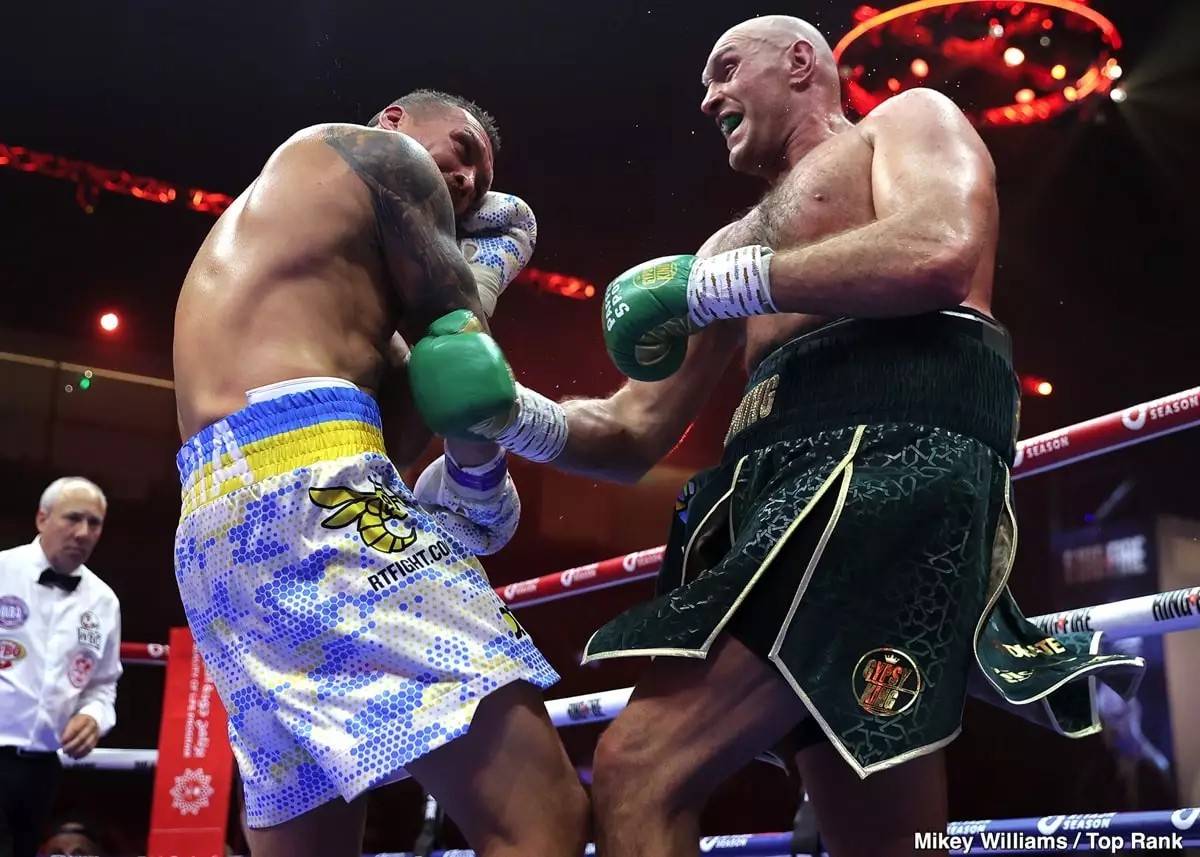BY BOXING HIT STAFF-
Tyson Fury’s boxing career has been marked by triumphant highs and tumultuous lows, but the psychological landscape leading up to his upcoming rematch with Oleksandr Usyk on December 21st provides a compelling case study in athlete mentality. In this context, Fury’s perspective reveals a deeply ingrained victim mentality that colors his view of his prior bout against Usyk and sets the stage for the next encounter. While confidence is often a prominent aspect of a boxer’s psyche, Fury’s anticipatory declaration of a need to “take the judges out of the equation” signifies a troubling tendency to position himself as a wronged party before ever stepping into the ring.
Fury’s assertion that he was a victim of the judging system after his first fight against Usyk exemplifies a narrative he seems unwilling to relinquish. Despite one judge scoring the match narrowly in Fury’s favor, critical analysis reveals that he was outperformed throughout several rounds, admitting something of a contradiction in his reasoning. Fury’s view is that he can only secure victory through a knockout, which suggests an instinctual reluctance to trust the formal mechanisms of boxing, notably the judging process that is integral to the sport. This belief may be rooted in past experiences, but it casts a shadow over his capacity to adapt and strategize.
Usyk, with an unblemished professional record of 22-0, proved tough and tactical in their last meeting. In the earlier rounds, he capitalized on Fury’s slower pace, showcasing combinations that highlighted Fury’s vulnerabilities. Fury’s retrospective comments imply a conscious or subconscious refusal to acknowledge the possibility of being outclassed. Notably, there exists a risk when engaging in self-pity: it may lead to a refusal to grow or adjust tactics, as it creates a comfortable narrative that excuses poor performance.
Fury has a complex history with refereeing and judges. His previous fights, such as the controversial decision against John McDermott in 2009, further emphasize a pattern of feeling aggrieved. He boasts of being wronged in pivotal moments rather than embracing those challenges as opportunities for improvement. While a boxer’s personal history naturally informs their mindset, persistent dwelling in past grievances can be counterproductive. The focus shifts from the fight at hand to an imagined conspiracy that detracts from strategic preparation and resilience.
Mistakes and misjudgments are inherent in sport, yet Fury’s rhetoric suggests a failure to engage with these circumstances constructively. Instead of evaluating how he might improve or refine his approach against Usyk, he seems preoccupied with mechanisms of blame. This mentality could severely affect his performance if he becomes distracted by fears of bias from officials or the past perceived wrongs.
Fury’s declaration of needing a knockout against Usyk indicates he recognizes that skill alone may not guarantee him victory against the slick, technical style that characterizes his opponent. Moreover, compared to the bombastic puncher Deontay Wilder, Usyk represents an entirely different challenge—one marked by strategic finesse rather than sheer power. This historical framing presents a conundrum: if Fury leans too heavily on his knockout strategy, especially against a fighter as adept as Usyk, he risks falling into old habits of underestimating his opponent’s capabilities.
Understanding this dynamic is crucial for Fury as he prepares to enter the ring. It could be a telling sign that he needs to refresh his approach and avoid falling into an emotional spiral concerning the judges or his fallibility. The prospect of pursuing a trilogy suggests a stubborn ambition, but one may ponder: are these discussions of future fights a distraction from the immediate challenge before him?
Fury’s framing of this upcoming rematch as one of personal redemption may serve him well if he cultivates a mindset centered on growth rather than victimization. Embracing a challenger’s mentality often revitalizes athletes, but it requires relinquishing the narrative of being imposed upon. The looming specter of an immediate loss might necessitate adaptation in Fury’s approach—not merely with technique but in openly addressing the psychological hurdles he faces.
Ultimately, as he gears up for a much-anticipated clash with Usyk, the question remains: will Tyson Fury step beyond his self-imposed victimhood and embrace the spirit of a fighter willing to learn, adapt, and grow, regardless of the outcome? Only time will tell, but rebirth often lies in recognizing the capacity for change.


Leave a Reply